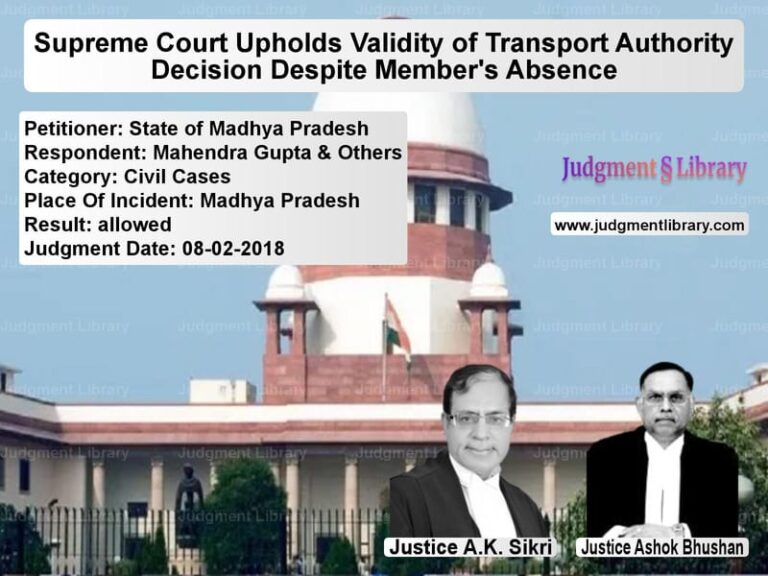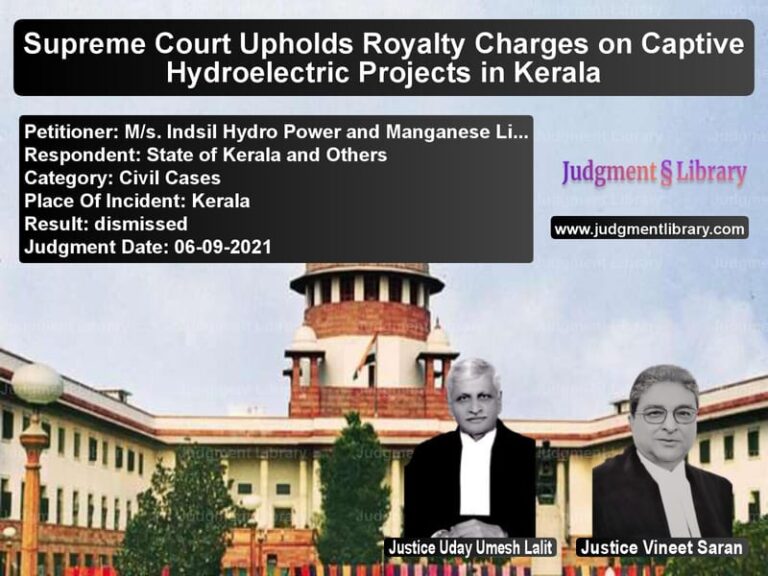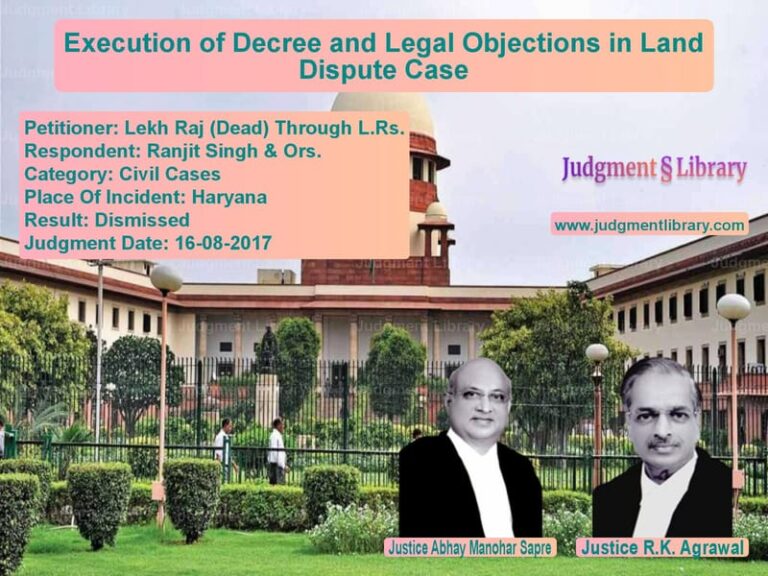Murder During Dacoity: Supreme Court Reduces Life Sentence to 10 Years
The case of Shajahan & Ors. vs. State Represented by Inspector of Police involved a brutal murder during a robbery at a pawn shop. The Supreme Court of India, in its judgment dated February 16, 2018, reviewed the sentence of the accused who had been convicted under Section 396 of the Indian Penal Code (IPC), which pertains to dacoity with murder.
This case highlights the balance courts must maintain between sentencing severity and rehabilitation, particularly in cases where mitigating circumstances exist.
Background of the Case
The crime occurred on the night of November 13-14, 2002. The accused—Basheer (A1), Shajahan (A2), and Babu @ Nawab Sahib (A4)—along with two other accomplices, Raja Mohammad (A3) and Balu @ Balasubramanian (A5), conspired to rob a pawn shop named Peri, owned by Muthaiyah (PW-1).
During the robbery, the accused restrained the shop’s caretaker, Muthukrishnan, and strangled him to death using a jute rope. They then stole:
- 4.788 kg of gold
- 5.595 kg of silver
- Valuables worth approximately Rs. 12,00,000
The crime was discovered early the next morning when the shop’s sweeper, Chellam (PW-4), found Muthukrishnan’s lifeless body and informed the shop owner. An FIR (Crime No. 257 of 2002) was registered under Sections 457, 380, and 302 IPC at the Mandharakuppam Police Station.
Investigation and Arrests
The police launched an extensive investigation that led to the arrests of the accused at different locations:
- Accused Raja Mohammad (A3) was arrested on February 6, 2003 at Panrutti bus stand.
- His confession led to the recovery of stolen jewelry and cash worth Rs. 46,000.
- Based on his information, Babu @ Nawab Sahib (A4) was arrested, leading to further recovery of stolen items.
- On February 6, 2003, Basheer (A1) and Shajahan (A2) were intercepted on a TVS-50 motorbike and found in possession of stolen jewelry.
- The final accused, Balu @ Balasubramanian (A5), was arrested on February 8, 2003.
The recovered items were identified by PW-1 and others who had pledged their valuables at the pawn shop.
Trial Court’s Judgment
The trial court convicted all the accused under Section 396 IPC and sentenced them to 10 years of rigorous imprisonment. The court ruled that the accused had committed dacoity resulting in murder but did not impose a death sentence or life imprisonment.
High Court’s Judgment
The prosecution appealed, seeking an enhancement of the sentence. The Madras High Court ruled that the offense under Section 396 IPC—which applies when a murder occurs during dacoity—required stricter punishment. The High Court:
- Enhanced the punishment from 10 years’ imprisonment to life imprisonment.
- Did not separately convict the accused under Section 302 IPC (murder), as Section 396 covers both dacoity and murder.
The accused then appealed before the Supreme Court.
Petitioner’s Arguments (Accused)
The appellants, through their counsel, contended:
“There was no intention to kill the caretaker. The act of restraining and strangulation was done in the heat of the robbery, without premeditated intent to commit murder.”
The defense also argued that the accused had already served over 10 years in prison and sought a reduction of their life sentence.
Respondent’s Arguments (State)
The prosecution countered:
“The murder was committed during the dacoity, making it a serious offense deserving the harshest punishment. The High Court correctly enhanced the sentence.”
The prosecution relied on Dinesh alias Buddha vs. State of Rajasthan (2006) 3 SCC 771, which emphasized that murder during dacoity should be treated with severity.
Supreme Court’s Judgment
The Supreme Court reviewed the case and agreed that the crime was serious. However, it also considered mitigating factors:
- The incident occurred in 2002, and the accused had already spent over a decade in jail.
- There was no evidence of the accused being armed.
- The murder was committed in the course of dacoity, but it was not premeditated.
The Court ruled:
“Considering the long lapse of time and the facts and circumstances of the case, the sentence of imprisonment for life is modified to ten years as directed by the trial court.”
Final Ruling
- The Supreme Court upheld the conviction under Section 396 IPC.
- The life sentence was reduced to 10 years.
- Since the appellants had already served over 10 years, they were ordered to be released immediately unless required in any other case.
Implications of the Judgment
The judgment carries significant legal implications:
- Clarifies Sentencing in Section 396 IPC Cases: The ruling highlights that courts have discretion in sentencing and need not always impose life imprisonment.
- Considers Reformative Justice: The judgment recognizes the accused’s long incarceration and allows for rehabilitation.
- Ensures Proportionality in Punishment: The Supreme Court balanced the severity of the crime with fairness in sentencing.
Conclusion
The Supreme Court’s ruling in Shajahan & Ors. vs. State Represented by Inspector of Police emphasizes the principle of proportional sentencing. While dacoity with murder is a grave offense, sentencing must account for the nature of the crime, time already served, and potential for reformation.
This judgment serves as an important precedent in criminal law, ensuring that justice is both firm and fair.
Petitioner Name: Shajahan & Ors.Respondent Name: State Represented by Inspector of PoliceJudgment By: Justice Ranjan Gogoi, Justice R. BanumathiJudgment Date: 16-02-2018
Don’t miss out on the full details! Download the complete judgment in PDF format below and gain valuable insights instantly!
Download Judgment: Shajahan & Ors. vs State Represented by Supreme Court of India Judgment Dated 16-02-2018.pdf
Direct Downlaod Judgment: Direct downlaod this Judgment
See all petitions in Murder Cases
See all petitions in Theft and Robbery Cases
See all petitions in Bail and Anticipatory Bail
See all petitions in Judgment by Ranjan Gogoi
See all petitions in Judgment by R. Banumathi
See all petitions in partially allowed
See all petitions in Modified
See all petitions in supreme court of India judgments February 2018
See all petitions in 2018 judgments
See all posts in Criminal Cases Category
See all allowed petitions in Criminal Cases Category
See all Dismissed petitions in Criminal Cases Category
See all partially allowed petitions in Criminal Cases Category







